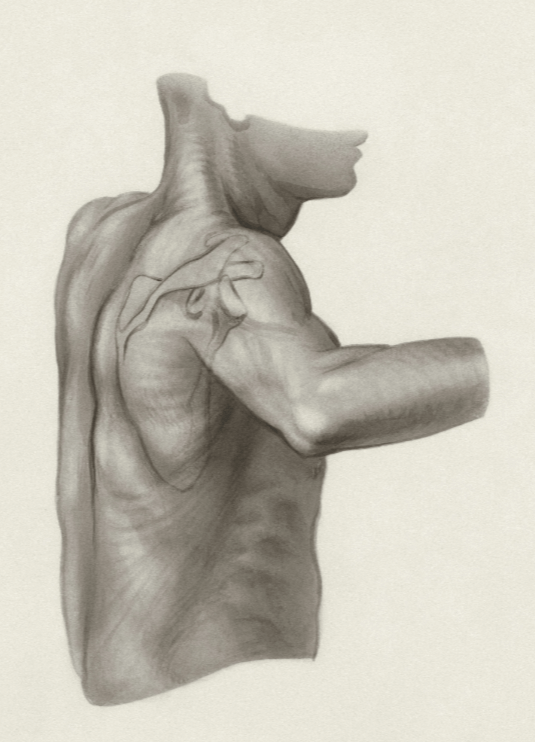Why Shoulder Pain Gets Worse at Night - How to Sleep Better
If shoulder pain keeps you up at night, you’re not alone. Many people with shoulder issues find their pain is worse when lying down — making it hard to fall asleep or stay asleep.
At Movement Health & Wellness, we see this often in people with rotator cuff injuries, bursitis, frozen shoulder, or impingement. The good news? Understanding why this happens can help you find relief and get back to sleeping comfortably.
Why Shoulder Pain Feels Worse at Night
1. Sleeping Position and Pressure
When you lie on your side — especially on the sore shoulder — the pressure increases around the joint and surrounding tendons. This compresses the space under the acromion (the subacromial space), which can irritate the rotator cuff and surrounding tissues.
Research shows that people with limited shoulder rotation or impingement are more likely to experience night pain.
2. Inflammation, Blood Flow, and Melatonin
When you’re lying down, blood flow and fluid distribution change, which can increase inflammation around irritated tissues.
There’s also a hormonal component — your body produces more melatonin at night to help you sleep. Melatonin is known to influence inflammation and pain perception.
In people with shoulder injuries, changes in melatonin levels may increase inflammatory activity or sensitivity to pain overnight (Ha et al., 2014).
3. Poor Sleep and Pain Sensitivity
Pain and sleep have a two-way relationship: pain disrupts sleep, and poor sleep increases pain sensitivity.
Studies show that even a single night of poor sleep can heighten the brain’s pain response and slow tissue recovery. Over time, this cycle of poor sleep and pain becomes self-reinforcing.
4. Psychological and Emotional Factors
Stress, anxiety, and negative thought patterns can amplify pain — especially when distractions are fewer at night. This is particularly true in conditions like frozen shoulder, where movement restrictions and chronic pain affect sleep and mood.
How to Sleep Better with Shoulder Pain
1. Adjust your sleeping position
Avoid lying on the sore shoulder.
Sleep on your opposite side with a pillow hugged in front of you to support the sore arm.
If you prefer lying on your back, place a small pillow under your elbow or upper arm for extra support.
2. Keep your shoulder moving
Gentle mobility and strengthening exercises for the rotator cuff and shoulder blade muscles help reduce joint irritation and improve stability.
Your chiropractor can guide you through the right exercises based on your shoulder condition.
4. Prioritise good sleep habits
Limit screens and bright light before bed (to support natural melatonin levels).
Keep a regular bedtime.
Try a calming routine — gentle stretching, breathing, or reading.
5. Get assessed early
If shoulder pain is disturbing your sleep regularly, it’s time to get it checked. The earlier shoulder issues are managed, the easier they are to treat — and the quicker you can return to sleeping comfortably.
Shoulder pain that worsens at night is common, but it doesn’t have to be something you “just live with.”
By addressing the underlying cause, improving your shoulder mobility, and supporting your body’s natural recovery, you can ease pain and reclaim your sleep.
If shoulder pain is keeping you up at night, book a consultation at Movement Health & Wellness.
Our chiropractors combine hands-on care with exercise-based rehab to help you move — and sleep — pain-free.
References
Ha, E. et al. (2014). Melatonin Plays a Role as a Mediator of Nocturnal Pain in Patients with Shoulder Disorders. Journal of Bone and Joint Surgery, 96(13): e108.Mengi, A., & Guler, M. (2022). Nocturnal pain in patients with rotator cuff-related shoulder pain. Musculoskeletal Science & Practice, 59, 102536.Krause, A., et al. (2019). The Pain of Sleep Loss: A Brain Characterization in Humans. Journal of Neuroscience, 39, 2291–2300.Kulkarni, R., et al. (2015). Subacromial shoulder pain. Shoulder & Elbow, 7, 135–143.
5. Zenian, J. (2010). Sleep position and shoulder pain. Medical Hypotheses, 74(4), 639–643.6. Ishii, D., et al. (2021). Limitation of the external glenohumeral joint rotation is associated with subacromial impingement syndrome. JSES International, 5, 430–438.7. Mulligan, E., et al. (2015). Sleep quality and nocturnal pain in patients with shoulder disorders. Journal of Shoulder and Elbow Surgery, 24(9), 1452–1457.8. Palsson, T., et al. (2023). Sleep deprivation increases pain sensitivity following acute muscle soreness. Sleep Medicine, 109, 75–81.9. Brindisino, F., et al. (2025). Association between pain, stiffness, mood, catastrophizing, and perceived social support in subjects with frozen shoulder. Shoulder & Elbow.

